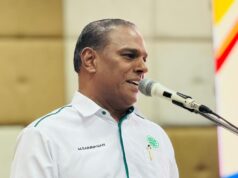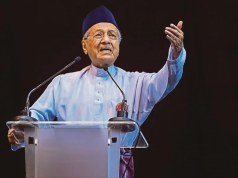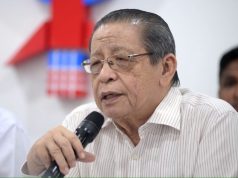

Judge Mohd Nazlan Mohd Ghazali in his judgement yesterday, said this was because Mohamed Apandi’s findings in a press statement were based on the evidence gathered by the Malaysian Anti-Corruption Commission (MACC) and as disclosed in the investigation paper (IP) at that time.
He said even though Mohamed Apandi and former chief commissioner of MACC Tan Sri Dzulkifli Ahmad decided that the investigations had by then been completed based on what had been gathered by MACC as recorded in the IP, any pronouncement of this court must be based on evidence produced to the court trying the case.
‘To put it simply, the opinion of DW14 (Mohamed Apandi, who was 14th defence witness) and DW17 (Dzulkifli, 17th defence witness) cannot replace the evidence before this Court to arrive at its decision.
Furthermore, it bears emphasis that in any event as the matter has now been translated into a formal criminal charge under Section 23 of the MACC Act, it is for the court to determine whether or not an offence as framed in the charge has been proved beyond reasonable doubt based on all the evidence made available in this trial,” he said in his judgment.
Yesterday the judge sentenced Najib to 12 years’ jail and a RM210 million fine after he was found guilty of all seven charges related to the misappropriation of RM42 million in SRC funds.
Justice Mohd Nazlan said it could not be said that the evidence of the former AG, the press statement and the testimony of Dzulkifli who played a key role in assisting Mohamed Apandi in the review of the IP from MACC, advanced the case of the defence in rebutting the prosecution case or in casting a reasonable doubt in the case of the prosecution.
“This is because both DW14 and DW17 in their evidence admitted in cross-examination, were not aware of further investigations undertaken by the MACC subsequent to the announcement of 26 January 2016 to NFA on the IP, where according to the lead prosecutor, statements were recorded from 76 new witnesses as well as further statements taken from existing witnesses. Both DW14 and DW17 were also not aware of the evidence of admission of knowledge contained in the affidavit affirmed by the accused in a defamation suit.
It is thus undeniable that the charge under Section 23 of the MACC too subsequently had the benefit of additional evidence which was not previously available at the time the announcement was made by the Attorney-General to NFA (No Further Action) the investigations,” he said.
On the other point on the setting up of the SRC International Sdn Bhd, the judge said in his evaluation, despite the matter being in the 10th Malaysia Plan, the impetus for the proposal to actually initiate what was embedded in the plan came from someone associated with 1Malaysia Development Berhad (1MDB) not the Government.
He said it was patently clear that the idea or proposal did not originate from some government agencies or Ministry.
“It has been earlier established by evidence that the accused has personal and private interests in SRC, a finding that remains unrebutted by the defence.
But the involvement of the accused in the incorporation of SRC is only one aspect of the facts of the case when compared to the totality of the evidence adduced against the accused.
Even if the accused was not singularly responsible for the setting up of SRC, the more pertinent point is that the approval for the establishment of SRC by the accused provided the true starting point for the involvement of the accused in the company,” he said.
The judge said the starting point was the SRC letter to the accused dated June 3 2011 requesting for his approval for SRC to obtain a RM3.95 billion loan from Retirement Fund Incorporated (KWAP).
“The minute by the accused on the SRC letter agreed to the request, and was addressed to the CEO of KWAP ( Datuk Azian Mohd Noh who was the 38th prosecution witness). The accused said that it was not his intention to instruct PW38 to blindly issue out the loan to SRC on the basis of the letter.
The accused was fully cognisant of the fact that PW38 was but an ex-officio member of the Investment Panel of KWAP and thus had no powers to approve the loan. Notwithstanding his minute indicating his approval on the SRC letter, the accused maintained that he was at all times fully aware that the legal authority to decide on the loan is vested in KWAP Investment Panel.
The accused agreed in cross-examination that he was PW38’s ultimate boss but with the caveat, subject to due process,” he said.
The court opined that accused’s testimony further included that his minute on the SRC letter should not be interpreted as an instruction by Azian since she had also placed SRC’s application through its usual process, as she would, as the CEO of KWAP, do for any other application.
Justice Mohd Nazlan said there was no dispute that the process at KWAP, Ministry of Finance (MOF) and the Cabinet were all albeit rushed, generally adhered to.
He said the relevant party entrusted with the approving authority made the decisions, not the accused.
“That has been established. The point of contention is the series of conduct and decisions made by the accused vis-à-vis the top officials in KWAP and MOF concerning the financing and the government guarantee, including his participation at the relevant meetings of the Cabinet, without which the financing and the guarantee would not have materialised.
The issue vis-à-vis the accused’s minute on the SRC letter to PW38 and his conversation with PW45 (KWAP chairman Tan Sri Wan Aziz Wan Abdullah) is not whether there was an instruction that must be followed.
The true test would be whether the act done would have been done or could have been effectively done if the person in question were not holding the kind of position of status or authority that he in fact was,” he said.
The judge further said, if it was not the case of PW45 and PW38 obeying the instructions of the Prime Minister and Finance Minister, it is manifest that they considered the influence of the accused to be sufficiently predominant so as to ensure that the Investment Panel was also apprised the stance of the accused.
The court was told that the Cabinet had approved the Government Guarantees of RM2 billion to back the loan to SRC in August 2011 and another RM2 billion in February 2012.
— BERNAMA










